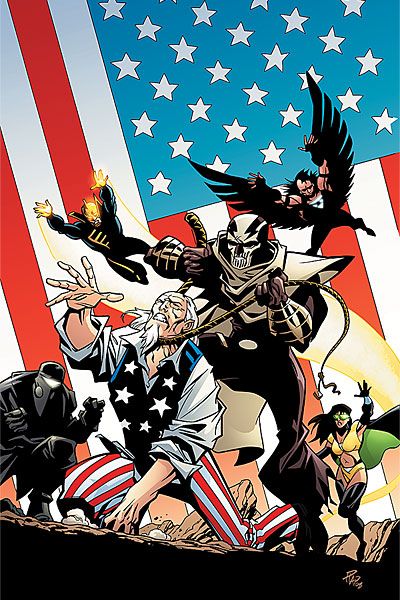"El Diablo" started with a strong first issue -- and with Phil Hester's artwork, the comic has looked damn good every issue -- but the story seemed to fall into a predictable rut halfway through the series. Gang member Chato (as El Diablo) would continue his quest for revenge (in the handy-dandy position of a spirit of vengeance) against those who betrayed him, and a nemesis called "Vorpal" was meanwhile searching for Chato. So it became like a cat and mouse game, with a couple of felines headed toward an inevitable showdown in the back alleys of the supernatural world.
And that was all fine, and told with skill, but it wasn't anything exceptional.
"El Diablo" #5, though, redirects the story, and throws my preconceptions out the window. Now I have no idea how the cat and mouse game will play out, and things have definitely taken a turn for the weird, and that makes for good reading.
Writer Jai Nitz does something else in this issue besides throw a curve at the reader: he brings in the post-"Infinite Crisis" version of the Freedom Fighters and writes them better than they've been written in any of their own series. The Freedom Fighters are a strange sight in a comic like this. "El Diablo," is, of course, a DC western concept, and even in this superhero incarnation it has maintained a kind of gritty postmodern western flavor, and the Freedom Fighters are patriotically garbed national heroes of substantial gaudiness.
But it's that contrast that makes their appearance work so well, and Nitz doesn't hesitate to challenge the patriotic foundations of the team, especially the embodiment of America known as Uncle Sam. "The spirit of America has an ocean of blood on its hands," says El Diablo. When Sam gives him the flying fists of the American dream and calls El Diablo on his own sins, he gets this reply: "You're the surface of the American dream, but I'm the guts." It's dialogue that challenges both characters self-concept as they battle, and it's nice to see that the resolution isn't neatly resolved. The core of America must include the old-fashioned, sleeves-rolled-up determination of Uncle Sam, but the back-alley hardscrabble success of El Diablo is just as essential. And though the Sam/Diablo confrontation isn't central to the plot of the series, it's central to the implicit themes of the series, and it works perfectly.
The issue ends with a radical shift to the El Diablo status quo, and as this series races towards its conclusion next issue, one wonders what kind of El Diablo will remain standing in the end. After four issues of world building, Nitz has unleashed an earthquake, and "El Diablo" may well end as powerfully as it began.

